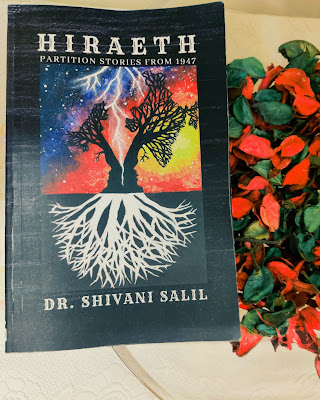The first time I had heard of Dr Shivani Salil was when she had accepted a blog challenge to write short stories every day for a month on a particular topic. I was fascinated with the very idea of someone writing 24 pieces in a month and that too on a topic as tough and emotional as partition.
I read a few of her pieces and was hooked. At one point she announced that the stories would be published in a book, which was later named Hiraeth. I was thrilled and ordered the book at first opportunity.
Let me tell you, first of all be careful about reading this book in public. Some of the stories are so emotional that your eyes tear up.
For me partition is something that I have seen in movies and read about in books. I have no personal connection to it. As depicted in movies or books it is a very painful and horrendous part of our history. A time when people were filled with hopelessness. A time that was given to madness and murder and mayhem. A time where cruelty and barbarity raised their ugly head.
But when I read Hiraeth what struck me in equal measure is the compassion shown by the people. Almost every story represents not just the danga-fassad but also the indomitable courage of people to help their neighbors and to lead them away from harms way, at great risk to themselves. There are stories attesting to this fact from either side of the border.
What also struck a chord with me is what Dr. Shivani Salil wrote in her preface. As a young girl she was teased for being a ‘refugee’s child’. She was obviously hurt and it was for sure meant as an insult. But she says as she outgrew her childhood and her understanding of the circumstances improved, she now takes pride in being referred to as a ‘refugee’s child’.
And this sense of pride comes from the fact that her grandparents did not pass on their bitterness to the next generation. They in turn channeled all their energy in building a future for themselves and the generations to follow. As did millions of other refugees. These are the people who had lost everything even hope and yet have built themselves up from it. This is my take from this book. Thank you Dr. Salil for writing this book.
Now for the best part, the stories I liked. Though all the stories tug at your heartstrings here are my top three –
1. Ehsaan – a heartwarming story where
the head of the house tries to repay the obligation, he feels for the ultimate
sacrifice that saved the lives of his two sons. The ending had me in tears.
2. Izzat – this story had me sobbing
for the father-daughter duo. Both showed ultimate courage in face of
insurmountable odds.
3. Kulfat – the story of a woman who
lost her husband and her response or lack of, to it.
Perhaps I chose these stories because they are women centric and I could identify with them.
Please read this book whenever you get an opportunity. For its beautiful stories, for the human emotions it portrays, for how it makes you feel and for the eloquent language that strings all these together.
